October 17, 2024
Disabled And Here: Interview with Claudia
Hi! How would you like to introduce yourself? I’m Claudia Alick (they/she), a Black disabled performer, producer, designer, writer, and user experience and inclusion expert. I founded Calling Up Justice, a social justice company that focuses on producing performances of justice across multiple mediums.
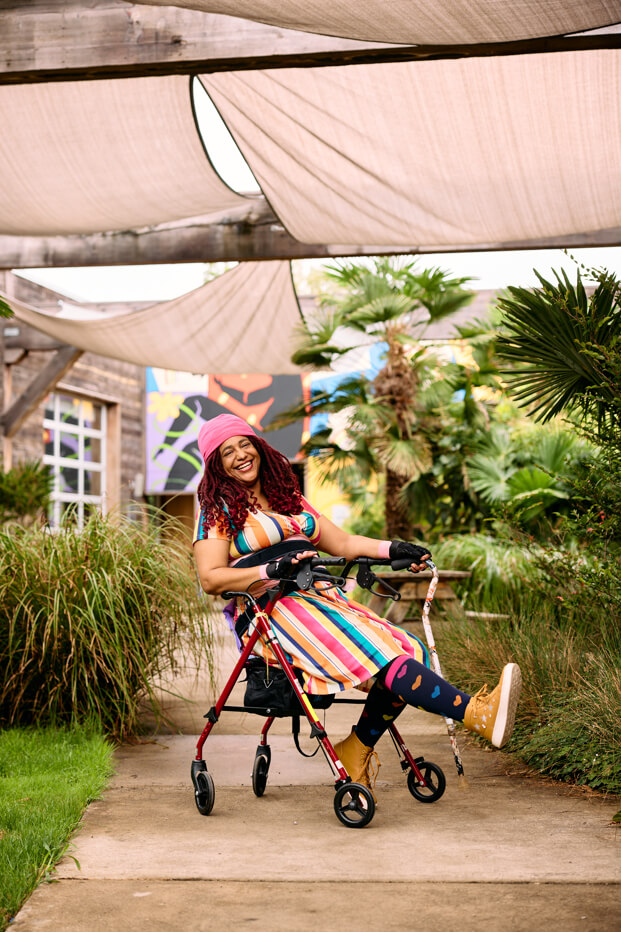
My work blends art and activism, and I’ve collaborated with a wide range of organizations internationally to create projects that center accessibility, equity, and social justice. I’m committed to pushing the boundaries of how we think about justice, community care, and transformative art.
In our Disabled And Here shoot, whether it was your mask or waist trainer with ice pack inserts, you were bringing the LOOKS. What does disabled fashion mean to you? Clothing should make you happy. The clothing that makes me happy is comfortable, supportive, and very colorful. I’m not trying to meet any specific aesthetic needs and I’m delighted that others enjoy the results of needs-based choices. I’m keeping the actual choices I need to make on a daily basis to a minimum and have clothing I can get into quickly. All things pair with all things. I am repeating choices, but swapping out color most days.
For instance, I have the exact same hair most days, and the only thing I switch out is a colored hat. I bought the hat in bulk so I have 15 different ones to match every outfit. I wear a lot of dashikis which are all different in design, but similar in shape. My outfits photograph well and while I am centering function, I’m also artistically making choices I find pleasing to the eye.
My home is decorated with my old broken walkers. I have a small collection of canes with bright patterns that are covered in stickers. The walls are covered in art, ribbons, bookcases, photos of loved ones. I curate my clothing and my home, so that I will often be able to have my eye see something that delights me. I am always with my body, so I try to cover it with things that are delightful.
When I was young, fashion often felt like it required pain or discomfort. I was taught that I had to get blisters and bleed, so that my feet and calves would look appropriate for a male gaze. Now I center clothing and shoes that empower me to get where I want to go in a way that prioritizes pleasure. I love that now I can look and feel fabulous at the same time.
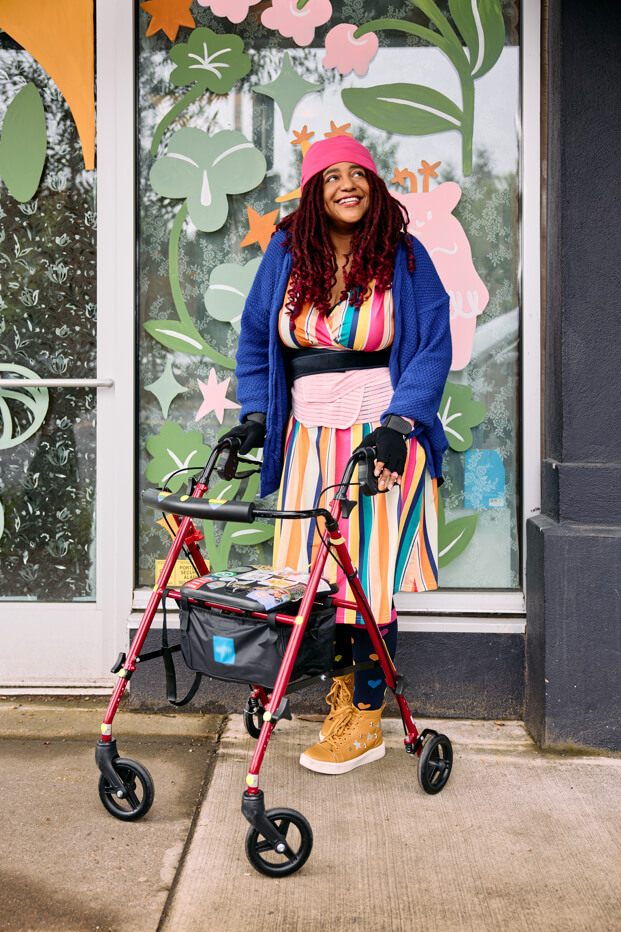
Can you tell us more about the Calling Up Justice practice? What have been a couple of your favorite projects to produce? I coined the term “Calling Up” to refer to the ideal culture that allows for calling in and calling out as positive parts of growing into better ways to be in the world. It’s a transmedia practice because, as my physical capacity goes away, digital presenting becomes essential for my cultural producing. It also allows me to center connectivity and accessibility, which have been lifelong passions.
I often describe my organization in organic terms – we are a mycorrhizal forest. Calling Up Justice operates like an interdependent living system that thrives through mutual support and diverse participation, both above and under the surface. Much like these natural systems, we benefit from mutual exchange, where all participants contribute to and gain from our networks in unique ways.
Calling Up Justice members come from a wide range of economic realities, some needing to balance their income with state benefits due to disability, while others engage in more traditional capitalist forms of labor exchange. We are cultural producers, tech workers, artists, social justice activists. Disability, racial and gender justice fuel our work.
While in town for Disabled and Here’s photoshoot, we produced a Why Mask Portland event that was a pop-up art exhibition and open mic celebrating disability justice and masking. We invited art galleries and theaters in town to commit to masking for COVID safety. The results of this wonderful exhibition were: community building, a really great time, and a lot of new faces inside our digital Why Mask gallery.
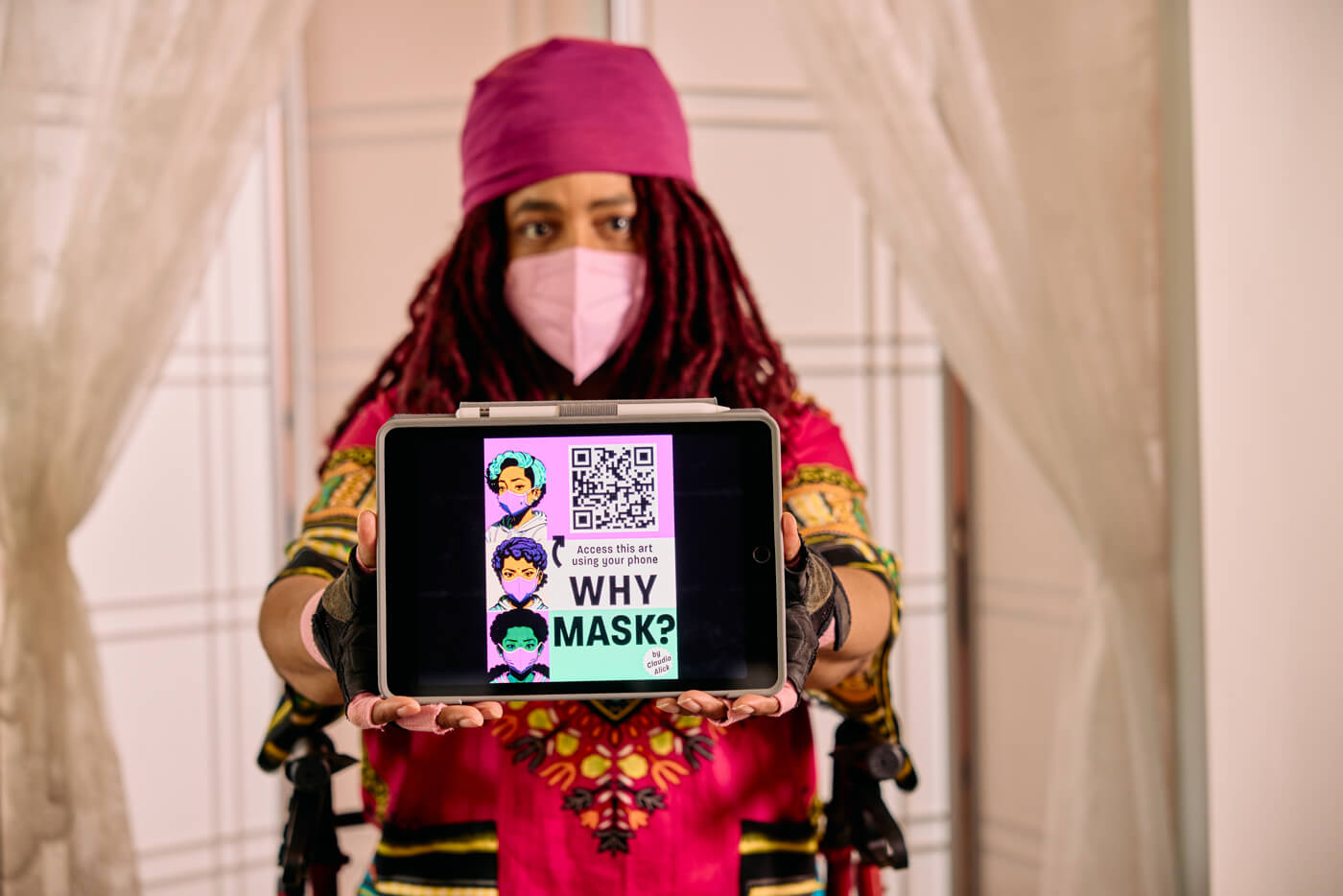
You and Jesenia recently co-hosted Accessible Virtual Pride. For those who weren’t able to join, can you recap its origin and talk a little about how Virtual Pride 2024 went? We were frustrated by the inability to attend Pride events in person due to a lack of community masking, so we gathered to celebrate LGBTQAI2S+ and Disabled community in safe and accessible circumstances.
Accessible Virtual Pride uses a stone soup producing model, centering Crip Time and tech systems that support collaborative design. The key is “many hands make light work” — when we have enough people to share responsibilities, we build resilience. Everyone is invited to participate. People contribute what they can, whether as donors or by offering their skills, and the events remain free for all.
This year, we had two days of online programming: one full day of workshops, panels, and performances; then a half-day livestream with recaps from our previous day, plus political speakers, youth activists, and awesome artists. The drag performance that closed out the show was epic.
What are some things you do just for fun or to unwind in between all the organizing and production work? Prior to the pandemic, one of my favorite things to do was go to a poetry slam. Nowadays, I attend digital karaoke parties and play co-op video games. I also make visual art to relax. I’m really grateful to have studio space to paint and also digital tools to be able to create art from bed. I think of my bed as a portal, and it’s a space where I get to rest and also hang out with friends and create cool things.
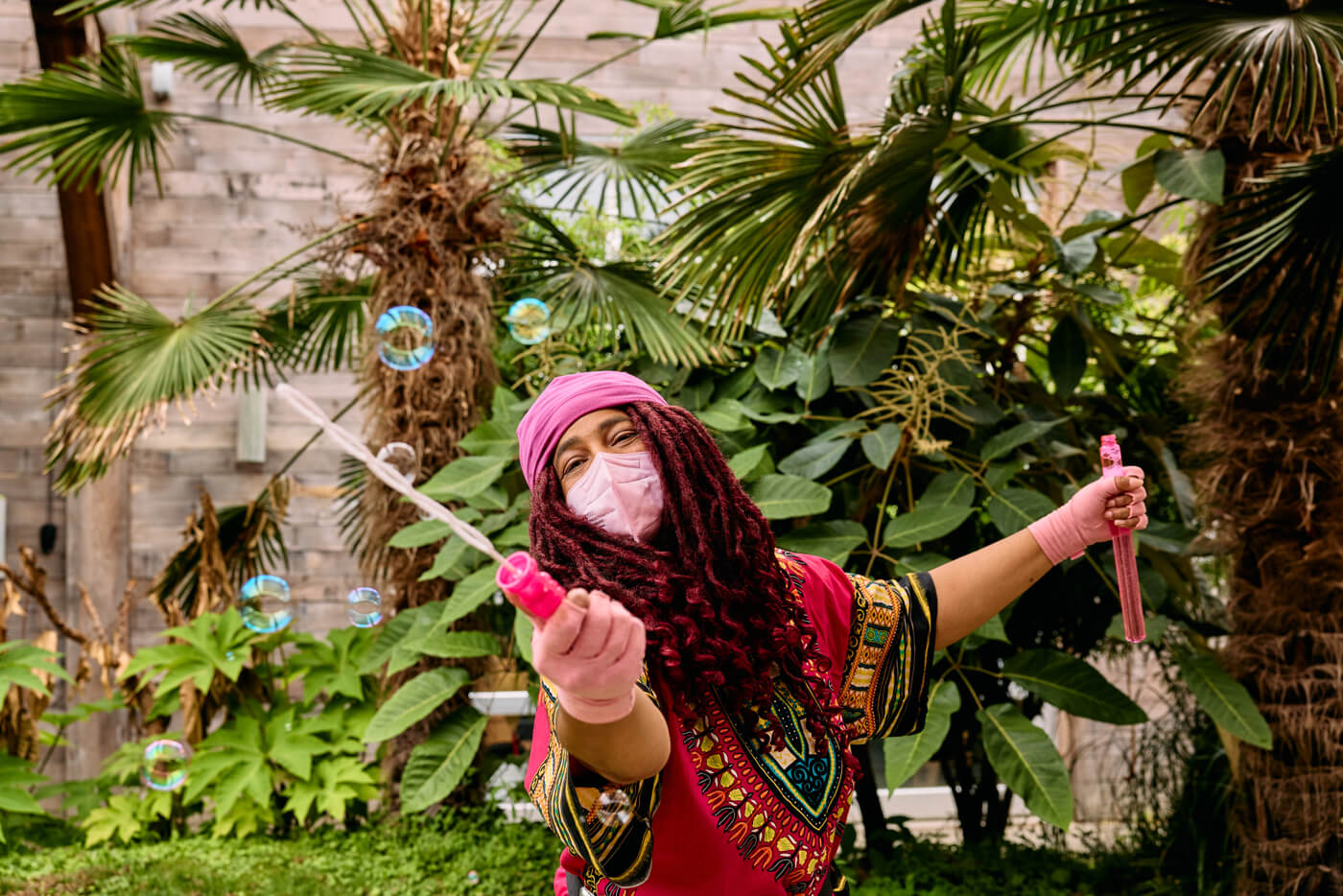
If you were to create a more accessible world, what are some must-haves? Go as magical or real-world as you’d like. The most vital “must-have” for an accessible world is a society that values accessibility. In this world there are no “special needs,” there are just “needs.” Under supremacy culture, most spaces are designed to have a baseline lack of accessibility for a majority of the population. Capitalism doesn't work unless some folks don’t have enough. So systems are designed to disempower some of us all the time.
In my practice, we have small interventionist performances, such as “the access check in,” that allow us to acknowledge that everyone has access needs and they all deserve to be met. One of the exciting things about working on the bleeding edge of technology, arts, and cultural production is that I get to see firsthand the incredible impact — starting with the goal of accessibility — has on processes and products. Turns out, not doing it at the last minute without enough resources, makes accessible design a lot easier.
Currently, most of the things I need to make the world more accessible cost money. In an ideal world, there would be no disability tax, and it would be less expensive to live. That's not a wish for something magical. It should be unimaginable that so many of us are denied what we need to just live. I don’t dream of extraordinary new accessibility tools, I just dream of extraordinarily accessible attitudes. After that, the policies, infrastructure, and results are a given. We could be doing something better than this so quickly.
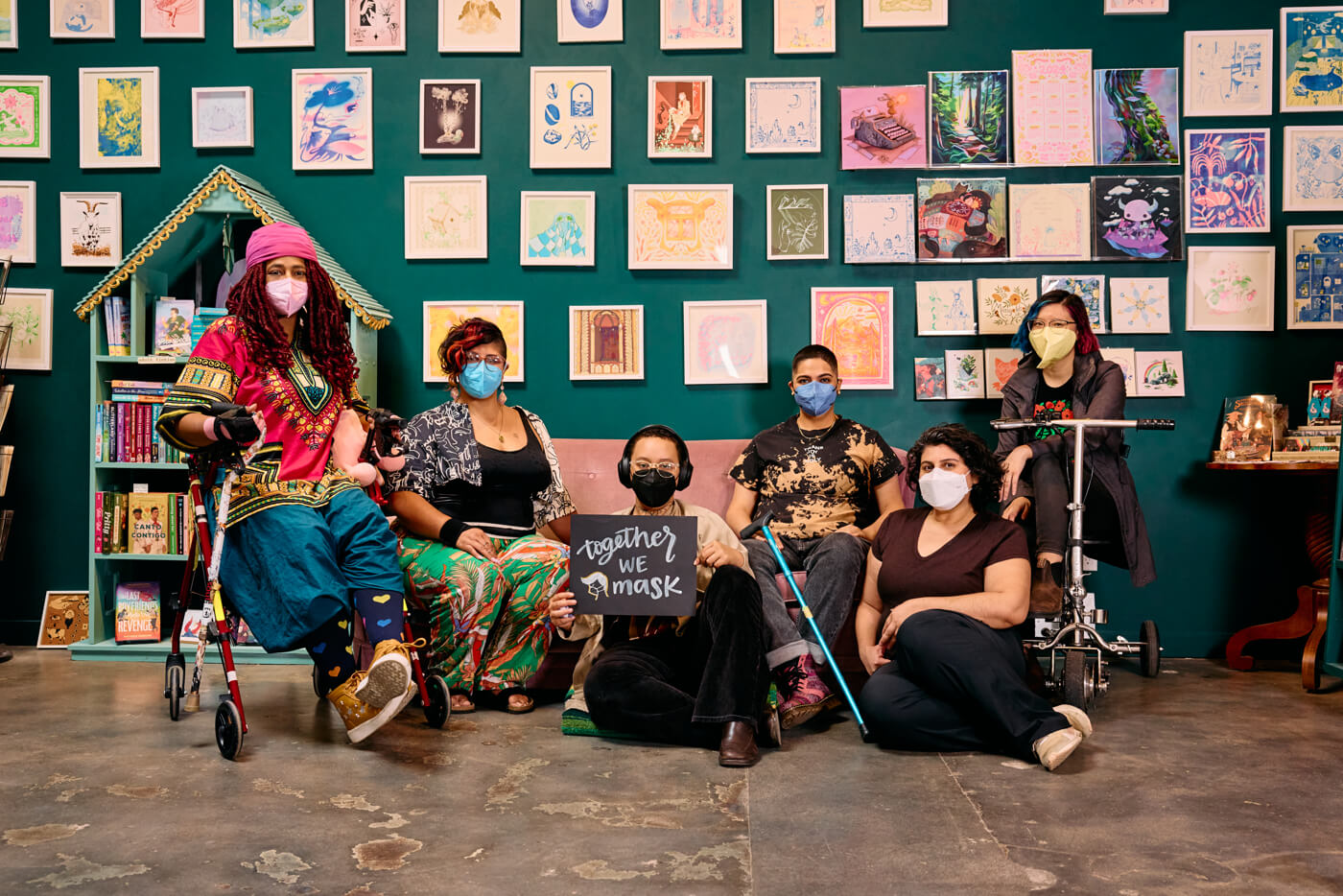
Is there anything else you’d like to share as we wrap up? Calling Up Justice is prolific and always recruiting. People are our power, so I’d love for y’all to join us. We invite you as an audience and collaborators. The best path to keeping in touch is signing up for our mailing list so you can receive updates on what we’re up to. We also have several digital platforms that you can join for activism (such as our Digital Encampments); personal practice (such as our Early Words journaling tool); and community (One Free Community is our digital third space on Discord).
We also have some awesome regular programming like Crip Create, our biweekly co-working and socializing space, Dis/Rep, a yearly empowerment program, and of course, Accessible Virtual Pride that folks can sign up for now on our website.
Final question: what are the best ways to support you as well as your work? Folks can support me on Patreon or support my entire Calling Up Justice practice on our Ko-fi. The entire practice uses Ko-fi to post updates. We also have a Flipcause for folks who want tax-deductible donations to the practice.
I’m grateful for any monetary support, but the best way to support my work is by participating in it. I’m going to leave a link to Why Mask and invite everyone who reads this article to check out that project and add their face to the gallery.
We keep us safe with participatory art and integrity-filled engagement. I’m so grateful to get to live my values by participating in this Disabled and Here photoshoot. Together we mask!
This interview has been edited for clarity and length.